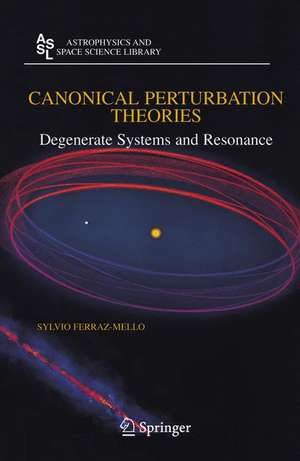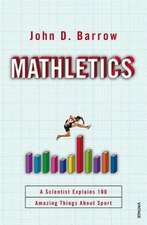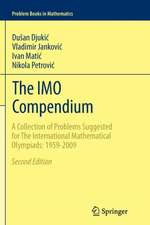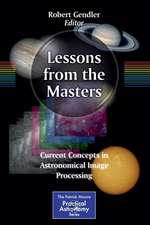Canonical Perturbation Theories: Degenerate Systems and Resonance: Astrophysics and Space Science Library, cartea 345
Autor Sylvio Ferraz-Melloen Limba Engleză Hardback – 16 ian 2007
| Toate formatele și edițiile | Preț | Express |
|---|---|---|
| Paperback (1) | 947.50 lei 43-57 zile | |
| Springer – 24 noi 2010 | 947.50 lei 43-57 zile | |
| Hardback (1) | 951.59 lei 43-57 zile | |
| Springer – 16 ian 2007 | 951.59 lei 43-57 zile |
Din seria Astrophysics and Space Science Library
- 24%
 Preț: 799.10 lei
Preț: 799.10 lei - 15%
 Preț: 647.92 lei
Preț: 647.92 lei - 18%
 Preț: 983.81 lei
Preț: 983.81 lei - 18%
 Preț: 790.28 lei
Preț: 790.28 lei -
 Preț: 359.86 lei
Preț: 359.86 lei -
 Preț: 389.71 lei
Preț: 389.71 lei - 20%
 Preț: 691.14 lei
Preț: 691.14 lei - 20%
 Preț: 816.18 lei
Preț: 816.18 lei - 18%
 Preț: 1011.27 lei
Preț: 1011.27 lei -
 Preț: 402.56 lei
Preț: 402.56 lei - 15%
 Preț: 664.93 lei
Preț: 664.93 lei -
 Preț: 398.15 lei
Preț: 398.15 lei - 18%
 Preț: 954.77 lei
Preț: 954.77 lei -
 Preț: 411.04 lei
Preț: 411.04 lei - 18%
 Preț: 1225.31 lei
Preț: 1225.31 lei - 18%
 Preț: 1843.29 lei
Preț: 1843.29 lei -
 Preț: 393.13 lei
Preț: 393.13 lei -
 Preț: 400.26 lei
Preț: 400.26 lei - 18%
 Preț: 953.82 lei
Preț: 953.82 lei - 18%
 Preț: 960.61 lei
Preț: 960.61 lei -
 Preț: 398.35 lei
Preț: 398.35 lei -
 Preț: 390.84 lei
Preț: 390.84 lei -
 Preț: 413.76 lei
Preț: 413.76 lei -
 Preț: 416.64 lei
Preț: 416.64 lei - 18%
 Preț: 947.67 lei
Preț: 947.67 lei -
 Preț: 404.51 lei
Preț: 404.51 lei - 18%
 Preț: 956.50 lei
Preț: 956.50 lei -
 Preț: 403.75 lei
Preț: 403.75 lei - 18%
 Preț: 1229.40 lei
Preț: 1229.40 lei - 18%
 Preț: 1224.99 lei
Preț: 1224.99 lei -
 Preț: 404.29 lei
Preț: 404.29 lei - 15%
 Preț: 654.77 lei
Preț: 654.77 lei - 18%
 Preț: 1248.20 lei
Preț: 1248.20 lei - 18%
 Preț: 955.25 lei
Preț: 955.25 lei - 18%
 Preț: 1846.28 lei
Preț: 1846.28 lei - 18%
 Preț: 1233.06 lei
Preț: 1233.06 lei - 18%
 Preț: 1234.77 lei
Preț: 1234.77 lei
Preț: 951.59 lei
Preț vechi: 1160.48 lei
-18% Nou
Puncte Express: 1427
Preț estimativ în valută:
182.14€ • 197.92$ • 153.10£
182.14€ • 197.92$ • 153.10£
Carte tipărită la comandă
Livrare economică 21 aprilie-05 mai
Preluare comenzi: 021 569.72.76
Specificații
ISBN-13: 9780387389004
ISBN-10: 0387389008
Pagini: 341
Ilustrații: XIV, 346 p. 60 illus.
Dimensiuni: 155 x 235 x 21 mm
Greutate: 0.62 kg
Ediția:2007
Editura: Springer
Colecția Springer
Seria Astrophysics and Space Science Library
Locul publicării:New York, NY, United States
ISBN-10: 0387389008
Pagini: 341
Ilustrații: XIV, 346 p. 60 illus.
Dimensiuni: 155 x 235 x 21 mm
Greutate: 0.62 kg
Ediția:2007
Editura: Springer
Colecția Springer
Seria Astrophysics and Space Science Library
Locul publicării:New York, NY, United States
Public țintă
ResearchCuprins
The Hamilton-Jacobi Theory.- Angle-Action Variables. Separable Systems.- Classical Perturbation Theories.- Resonance.- Lie Mappings.- Lie Series Perturbation Theory.- Non-Singular Canonical Variables.- Lie Series Theory for Resonant Systems.- Single Resonance near a Singularity.- Nonlinear Oscillators.
Recenzii
From the reviews:
"The book consists of 10 chapters and four appendices. … Undoubtedly, the monograph will be useful for postgraduate students." (Sergei Georgievich Zhuravlev, Zentralblatt MATH, Vol. 1122 (24), 2007)
"The book by Sylvio Ferraz-Mello provides a deep insight in perturbation theories. … the mathematical presentation of the different facets is always accompanied by a number of case studies and examples. Such peculiarity makes the book unique … . Thanks to the … author, the book is recommended for both teaching and research purposes: the didactical and self-contained aspects address the book to advanced undergraduate students; the researchers in Dynamical Systems and Celestial Mechanics will certainly enjoy the excellent and deep presentation of perturbation theories." (Alessandra Celletti, Celestial Mechanics and Dynamical Astronomy, Vol. 100 (4), 2008)
"The purpose of this book is … ‘to deal with the perturbation theories used in Celestial Mechanics, but they should be presented in a universal way, so as to be understandable by investigators and students from related fields of science.’ In other words, one does not need a special background in astronomy to read and understand the book. … a large number of the examples will be of interest to people working in Hamiltonian theory. … a valuable source of material on conservative systems." (Ferdinand Verhulst, SIAM Review, Vol. 50 (2), 2008)
"The book consists of 10 chapters and four appendices. … Undoubtedly, the monograph will be useful for postgraduate students." (Sergei Georgievich Zhuravlev, Zentralblatt MATH, Vol. 1122 (24), 2007)
"The book by Sylvio Ferraz-Mello provides a deep insight in perturbation theories. … the mathematical presentation of the different facets is always accompanied by a number of case studies and examples. Such peculiarity makes the book unique … . Thanks to the … author, the book is recommended for both teaching and research purposes: the didactical and self-contained aspects address the book to advanced undergraduate students; the researchers in Dynamical Systems and Celestial Mechanics will certainly enjoy the excellent and deep presentation of perturbation theories." (Alessandra Celletti, Celestial Mechanics and Dynamical Astronomy, Vol. 100 (4), 2008)
"The purpose of this book is … ‘to deal with the perturbation theories used in Celestial Mechanics, but they should be presented in a universal way, so as to be understandable by investigators and students from related fields of science.’ In other words, one does not need a special background in astronomy to read and understand the book. … a large number of the examples will be of interest to people working in Hamiltonian theory. … a valuable source of material on conservative systems." (Ferdinand Verhulst, SIAM Review, Vol. 50 (2), 2008)
Textul de pe ultima copertă
Canonical Perturbation Theories, Degenerate Systems and Resonance presents the foundations of Hamiltonian Perturbation Theories used in Celestial Mechanics, emphasizing the Lie Series Theory and its application to degenerate systems and resonance.
This book is the complete text on the subject including advanced topics in Hamiltonian Mechanics, Hori’s Theory, and the classical theories of Poincaré, von Zeipel-Brouwer, and Delaunay. Also covered are Kolmogorov’s frequency relocation method to avoid small divisors, the construction of action-angle variables for integrable systems, and a complete overview of some problems in Classical Mechanics.
Sylvio Ferraz-Mello makes these ideas accessible not only to Astronomers, but also to those in the related fields of Physics and Mathematics.
This book is the complete text on the subject including advanced topics in Hamiltonian Mechanics, Hori’s Theory, and the classical theories of Poincaré, von Zeipel-Brouwer, and Delaunay. Also covered are Kolmogorov’s frequency relocation method to avoid small divisors, the construction of action-angle variables for integrable systems, and a complete overview of some problems in Classical Mechanics.
Sylvio Ferraz-Mello makes these ideas accessible not only to Astronomers, but also to those in the related fields of Physics and Mathematics.
Caracteristici
Each theory is presented as a complete recipe which can be followed towards practical application, including warnings against known difficulties Presents complete solutions and action-angle variables of the elementary integrable systems that serve as starting points in Perturbations Theory The only book which considers extensively the problem of overcoming the small divisors that appear when Perturbations Theory is used to construct solutions in the neighborhood of a resonance of the proper frequencies










